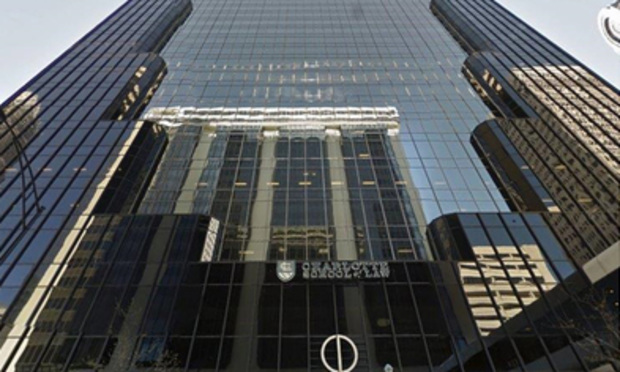Ex-Charlotte Law Students Balk at Class Action Settlement
Some former students of the now-closed institution are asking a federal judge to deny a proposed $2.7 million settlement on the grounds that owner InfiLaw Corp. has not adequately demonstrated that it has very little money to pay the plaintiffs.
November 27, 2018 at 02:01 PM
5 minute read
 The now-closed Charlotte School of Law in Charlotte, North Carolina.
The now-closed Charlotte School of Law in Charlotte, North Carolina.
A proposed class action settlement between the owner of the now-closed Charlotte School of Law and former students is facing sharp opposition from some plaintiffs who say defendant InfiLaw Corp. hasn't offered enough financial evidence to justify a relatively low $2.65 million settlement amount.
Judge Graham Mullen of the U.S. District Court for the Western District of North Carolina preliminarily approved the settlement in September, but the objectors claim that attorneys representing the settling plaintiffs merely took InfiLaw at its word that its coffers have largely been depleted and that very little money remains from its insurance policy with which to pay former students, who claim they were misled about Charlotte's accreditation status with the American Bar Association.
“The point is that we don't know anything for sure,” said Kyle Nutt, an attorney with Wilmington, North Carolina, firm Shipman & Wright who is representing 24 former Charlotte students who are objecting to the settlement. “Their CFO submitted an affidavit that said, 'We can't pay more than $150,000 and we have the depleted remains of this insurance policy—that's all we can ever pay. And here are some financials to support that.' The forensic accountant looked at those financials and said, 'They don't establish what you said they establish.'”
In a memorandum of opposition filed Monday, the 24 objectors represented by Nutt asked the court to deny final approval of the settlement. Monday was the deadline for opponents to file notice with the court.
Anthony Majestro, among the attorneys representing the settling plaintiffs, did not respond to requests for comment on the mounting opposition Tuesday. But he said in an interview in September that although the settlement amount is low and cannot make the estimated 2,500 class members whole, it's the best opposition because prolonged litigation will further deplete the InfiLaw's remaining insurance funds. David Mills, an attorney with Cooley who is representing InfiLaw, did not respond to requests for comment Tuesday.
If approved, the settlement would end four federal suits and 90 state court suits brought against the school by former Charlotte students who claim they should have been informed that the school had run afoul of the ABA's accreditation standards back in 2014. The school's accreditation woes weren't disclosed publicly until the fall of 2016 when the ABA put the school on probation. Shortly thereafter, the U.S. Department of Education booted the for-profit law school from the federal student loan program, and Charlotte eventually closed in August of 2017.
InfiLaw and several firms representing the student plaintiffs met for a settlement conference in April, but Nutt's memorandum claims his group of plaintiffs were excluded from further conversations after they raised concerns about the constitutionality of the proposal, which must meet strict requirements because the so-called “limited fund” settlement does not allow class members to opt out and bring their own actions against InfiLaw.
The objecting plaintiffs allege that not only has there been no due diligence on the amount of financial resources that remain at InfiLaw—attorneys for the settling plaintiffs have taken no depositions, they note—but that the proposed class is over inclusive. It includes students who attended Charlotte as far back as 2013. (The objectors represented by Nutt attended in the school's final year of operations.)
“Here, there are students who attended [Charlotte] both before and after the first finding that [Charlotte] was officially out of compliance with ABA Standards,” the memorandum reads. “Many of the class members were able to graduate, pass the bar, and obtain gainful employment; others transferred with a substantial amount of their earned credits intact. The question of damages is thus not as simple or broad as merely identifying the total tuition paid during the relevant period as Defendants have suggested.”
Under the proposal, InfiLaw would contribute $150,000 to the settlement fund, with another $2.5 million from its insurance policy. That's far less than the estimated $105 million needed to repay a single year of tuition for the 2,500 class members, according to the settlement motion. InfiLaw would also pay a portion of any proceeds from its three pending lawsuits against the ABA brought on behalf of its schools—Charlotte; Arizona Summit Law School; and Florida Coastal School of Law.
But even that provision is problematic, according to the objectors, because it would allow InfiLaw to use any lawsuit proceeds to first settle other liabilities before contributing to the settlement fund.
“The Supreme Court has made it clear that these mandatory, non-opt out settlements in a class action context are rare and have to be very closely scrutinized because they implicate the constitutional rights of class members to a right to trial by jury and due process,” Nutt said. “We don't believe that what has been presented satisfies what the Supreme Court indicates what must be satisfied in a case like this.”
Read more:
Valparaiso Is Latest to Join the Crowd of Defunct Law Schools
Law School Suits Provide Rare Glimpse into ABA Accreditation Process
This content has been archived. It is available through our partners, LexisNexis® and Bloomberg Law.
To view this content, please continue to their sites.
Not a Lexis Subscriber?
Subscribe Now
Not a Bloomberg Law Subscriber?
Subscribe Now
NOT FOR REPRINT
© 2025 ALM Global, LLC, All Rights Reserved. Request academic re-use from www.copyright.com. All other uses, submit a request to [email protected]. For more information visit Asset & Logo Licensing.
You Might Like
View All
Chicago Law Requiring Women, Minority Ownership Stake in Casinos Is Unconstitutional, New Suit Claims
5 minute read
Free Microsoft Browser Extension Is Costing Content Creators, Class Action Claims
3 minute read
Fired by Trump, EEOC's First Blind GC Lands at Nonprofit Targeting Abuses of Power
3 minute read
Indian Law Firm Cyril Amarchand Rolls Out AI Strategy, Adopts Suite of AI Tools
Trending Stories
- 1Public Notices/Calendars
- 2Wednesday Newspaper
- 3Decision of the Day: Qui Tam Relators Do Not Plausibly Claim Firm Avoided Tax Obligations Through Visa Applications, Circuit Finds
- 4Judicial Ethics Opinion 24-116
- 5Big Law Firms Sheppard Mullin, Morgan Lewis and Baker Botts Add Partners in Houston
Who Got The Work
J. Brugh Lower of Gibbons has entered an appearance for industrial equipment supplier Devco Corporation in a pending trademark infringement lawsuit. The suit, accusing the defendant of selling knock-off Graco products, was filed Dec. 18 in New Jersey District Court by Rivkin Radler on behalf of Graco Inc. and Graco Minnesota. The case, assigned to U.S. District Judge Zahid N. Quraishi, is 3:24-cv-11294, Graco Inc. et al v. Devco Corporation.
Who Got The Work
Rebecca Maller-Stein and Kent A. Yalowitz of Arnold & Porter Kaye Scholer have entered their appearances for Hanaco Venture Capital and its executives, Lior Prosor and David Frankel, in a pending securities lawsuit. The action, filed on Dec. 24 in New York Southern District Court by Zell, Aron & Co. on behalf of Goldeneye Advisors, accuses the defendants of negligently and fraudulently managing the plaintiff's $1 million investment. The case, assigned to U.S. District Judge Vernon S. Broderick, is 1:24-cv-09918, Goldeneye Advisors, LLC v. Hanaco Venture Capital, Ltd. et al.
Who Got The Work
Attorneys from A&O Shearman has stepped in as defense counsel for Toronto-Dominion Bank and other defendants in a pending securities class action. The suit, filed Dec. 11 in New York Southern District Court by Bleichmar Fonti & Auld, accuses the defendants of concealing the bank's 'pervasive' deficiencies in regards to its compliance with the Bank Secrecy Act and the quality of its anti-money laundering controls. The case, assigned to U.S. District Judge Arun Subramanian, is 1:24-cv-09445, Gonzalez v. The Toronto-Dominion Bank et al.
Who Got The Work
Crown Castle International, a Pennsylvania company providing shared communications infrastructure, has turned to Luke D. Wolf of Gordon Rees Scully Mansukhani to fend off a pending breach-of-contract lawsuit. The court action, filed Nov. 25 in Michigan Eastern District Court by Hooper Hathaway PC on behalf of The Town Residences LLC, accuses Crown Castle of failing to transfer approximately $30,000 in utility payments from T-Mobile in breach of a roof-top lease and assignment agreement. The case, assigned to U.S. District Judge Susan K. Declercq, is 2:24-cv-13131, The Town Residences LLC v. T-Mobile US, Inc. et al.
Who Got The Work
Wilfred P. Coronato and Daniel M. Schwartz of McCarter & English have stepped in as defense counsel to Electrolux Home Products Inc. in a pending product liability lawsuit. The court action, filed Nov. 26 in New York Eastern District Court by Poulos Lopiccolo PC and Nagel Rice LLP on behalf of David Stern, alleges that the defendant's refrigerators’ drawers and shelving repeatedly break and fall apart within months after purchase. The case, assigned to U.S. District Judge Joan M. Azrack, is 2:24-cv-08204, Stern v. Electrolux Home Products, Inc.
Featured Firms
Law Offices of Gary Martin Hays & Associates, P.C.
(470) 294-1674
Law Offices of Mark E. Salomone
(857) 444-6468
Smith & Hassler
(713) 739-1250








